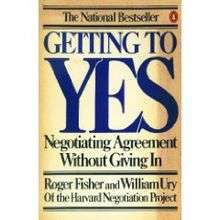Getting to Yes
 | |
| Author | Roger Fisher and William L. Ury; and Bruce Patton in some editions |
|---|---|
| Country | United Kingdom |
| Language | English |
| Genre | Non-fiction |
| Publisher | Penguin Group |
Publication date | 1981 |
| Media type | Print, e-book |
| Pages | 200 pp. |
| ISBN | 978-0140157352 |
| OCLC | 24318769 |
| 158/.5 20 | |
| LC Class | BF637.N4 F57 1991 |
| Followed by | Getting Past NO |
Getting to Yes: Negotiating Agreement Without Giving In is a best-selling 1981 non-fiction book by Roger Fisher and William L. Ury. Reissued in 1991 with additional authorship credit to Bruce Patton, the book made appearances for years on the Business Week bestseller list. The book suggests a method called "principled negotiation" or "negotiation of merits".
Background
Members of the Harvard Negotiation Project, Fisher and Ury focused on the psychology of negotiation in their method, "principled negotiation," finding acceptable solutions by determining which needs are fixed and which are flexible for negotiators.[1] By 1987, the book had been adopted in several U.S. school districts to help students understand "non-adversarial bargaining".[2] In 1991, the book was issued in a second edition with Bruce Patton, an editor of the first edition, listed as a co-author. The book became a perennial best-seller. By July 1998, it had been appearing for more than three years on the Business Week "Best-Seller" book list.[3] As of December 2007, it was still making appearances on the list as one of the "Longest Running Best Sellers" in paperback business books.[4]
Method
The method of principled negotiation is based on five propositions:[5]
- "Separate the people from the problem"
- "Focus on interests, not positions"
- "Invent options for mutual gain"
- "Insist on using objective criteria"
- "Know your BATNA (Best Alternative To Negotiated Agreement)"
Getting Past No
Getting Past No is a reference book on collaborative negotiation in difficult situations, written by William L. Ury. First published in September 1991 and revised in 2007, this book is the sequel to Getting to Yes.
See also
References
- ↑ Morrow, Lance (Dec 7, 1981). "The Dance of Negotiation". Time. Retrieved 2009-08-06.
- ↑ Piele, Philip K.; Stuart C. Smith (May 12, 1987). "Alternatives To adversarial negotiations being used successfully". Eugene Register-Guard. Retrieved 2009-08-06.
- ↑ "The Business Week Best-Seller List". Business Week. July 6, 1998. Retrieved 2009-08-06.
- ↑ "The Business Week Best Seller List". Business Week. December 3, 2007. Archived from the original on October 3, 2008. Retrieved 2009-08-06.
- ↑ Fisher, R., Ury, W. and Patton, B. (1991). Getting to Yes: negotiating Agreement Without Giving In. Second Edition. New York: Penguin Books.
External links
- Book Website
- Book Review and Summary of Getting to Yes
- William Ury: The Walk From "No" to "Yes" - Video from October 2010